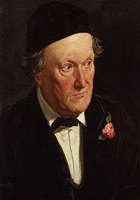William Bell Scott
William Bell Scott Poems
‘Open the door! Thou canst not understand
My mission, thou spoilt child of many a god,
Thou who dost claim the heart for thy abode;
...
‘Art for art's sake,’—very well,
Your picture you don't care to sell?
Yes, yes, I do, and thus I try
...
Ah, did she pass so coldly by
The tenderest love in all the earth,
Making his lifetime one long sigh,
That never knew a morn of mirth?
...
The widow heard Elijah's tread,
She heard his staff against the door,
She wrapped the sackcloth round her head,
...
In the first watch of the night,
One candle all my light,
I saw a Spirit near the door
Standing raised above the floor,
...
Once and once only, and no more,
Art hath reached the topmost bough;
The goodliest fruit of all his store
Our well-filled garner holds till now.
...
Another day hath dawned
Since, hastily and tired, I threw myself
Into the dark lap of advancing sleep.
...
That foxglove by the garden gate,
The very day the war began,
Opened its first, its lowest flower.
...
A celtic Saint this tale first told,
Ere Dante's birth the saint was cold,
But he in faith with mortal eyes
Had been uplifted through the skies
...
The old witch-wife beside her door
Sat spinning with a watchful ear,
A horse's hoof upon the road
Is what she waits for, longs to hear,
...
There was a time before the chick could fly,
But still was screened by the maternal wing,
...
Within the unchanging twilight
Of the high land of the gods,
Between the murmuring fountain
And the Ash-tree, tree of trees,
...
The children in their best at last
Were gathered on the lawn,
By sex divided, or by ages classed;
...
Farewell, it is not much to say
When bright night follows pleasant day,
And when the traveller takes the way
...
Is this indeed All-Hallow's day,
When fairies hold their annual play?
As out of school like bees they fly,
...
In life we judge and estimate,
With our dearest even debate,
And strive to hold the balance true
...
Spring comes with all the firstlings of the year
Leaping around her, careless of the cold;
...
Dinner and day together go,
As round the table still we dwell,
Watching the sun descending slow,
...
I.
‘Feeble waifs on darkling strand;
Lost the power of heart or hand;
Better the vilest starveling slave,
...
William Bell Scott Biography
William Bell Scott (12 September 1811 – 22 November 1890), British poet and artist, son of Robert Scott (1777-1841), the engraver, and brother of David Scott, the painter, was born in Edinburgh. While a young man he studied art and assisted his father, and he published verses in the Scottish magazines. In 1837 he went to London, where he became sufficiently well known as an artist to be appointed in 1844 master of the government school of design at Newcastle-on-Tyne. He held the post for twenty years, and did good work in organizing art-teaching and examining under the Science and Art Department. He did much fine decorative work, too, on his own account, notably at Wallington Hall, in the shape of eight large pictures illustrating Border history, with life-size figures, supplemented by eighteen pictures illustrating the ballad of Chevy Chase in the spandrels of the arches of the hall. For Penkill Castle, Ayrshire, he executed a similar series, illustrating James I's The Kingis Quair. In Newcastle, Scott was visited by all the Rossetti family, and Dante Gabriel Rossetti painted Maria Leathart's portrait at Scott's house 14 St Thoms' Crescent (plaque erected 2005). Algernon Charles Swinburne, who wrote two poems to Scott, spent much time with him in Newcastle after being sent down from Oxford. After 1870 Scott was much in London, where he bought a house in Chelsea, and he was an intimate friend of Rossetti[2] and in high repute as an artist and an author. He was, however, at daggers drawn with John Ruskin. His poetry, which he published at intervals (notably Poems, 1875, illustrated by etchings by himself and Alma-Tadema), recalled Blake and Shelley, and was considerably influenced by Rossetti; he also wrote several volumes of artistic and literary criticism, and edited Keats, L.E.L., Byron, Coleridge, Shelley, Shakespeare and Scott. He resigned his appointment under the Science and Art Department in 1885, and from then till his death he was mainly occupied in writing his reminiscences, which were published posthumously in 1892, with a memoir by Professor Minto. It is for his connection with Rossetti's circle that Bell Scott will be chiefly remembered)
The Best Poem Of William Bell Scott
Love And Death
‘Open the door! Thou canst not understand
My mission, thou spoilt child of many a god,
Thou who dost claim the heart for thy abode;
Open the door, lest I put forth my hand
And touch thee too, or give such dire command
To thy vile brother, Hatred,—now I hear
The quills of thy unquiet wings with fear
Quiver against thy flanks: no more withstand.’
‘Oh Death, why comest thou so soon so far?
Why comest thou before the appointed hour?
I shall not make way for a fate so dire.’
‘Poor child, I pass despite thy bolt and bar,
The torch lit here to grace the bridal bower
I make it mine to light the funeral pyre.’
